Jim Brown, all-time NFL great running back and social activist, dies at 87

NFL star Jim Brown dead at 87
Pro Football Hall of Famer Jim Brown, the running back who retired at the peak of his career to become an actor as well as a prominent civil rights advocate during the 1960s, has died. The 87-year-old passed away at his home in Los Angeles on Thursday night with his wife, Monique, by his side, according to a family spokesperson.
Pro Football Hall of Famer Jim Brown, the unstoppable running back who retired at the peak of his brilliant career to become an actor as well as a prominent civil rights advocate during the 1960s, has died. He was 87.
A spokeswoman for Brown’s family said he passed away peacefully in his Los Angeles home on Thursday night with his wife, Monique, by his side.
"To the world, he was an activist, actor, and football star," Monique Brown wrote in an Instagram post. "To our family, he was a loving husband, father, and grandfather. Our hearts are broken."
One of the greatest players in football history and one of the game’s first superstars, Brown was chosen the NFL’s Most Valuable Player in 1965 and shattered the league’s record books in a short career spanning 1957-65.
Brown led the Cleveland Browns to their last NFL title in 1964 before retiring in his prime after the ’65 season to become an actor. He appeared in more than 30 films, including "Any Given Sunday" and "The Dirty Dozen."
An unstoppable runner with power, speed and endurance, Brown’s arrival sparked the game’s burgeoning popularity on television.
As Black Americans fought for equality, Brown used his platform and voice to advance their cause.
READ MORE: Goodell: NFL won’t tolerate racism, vows changes amid Dolphins fallout
In 1967, Brown organized a meeting in Cleveland of the nation’s top Black athletes, including Bill Russell and Lew Alcindor, who later became Kareem Abdul-Jabbar, to support boxer Muhammad Ali’s fight against the war in Vietnam.
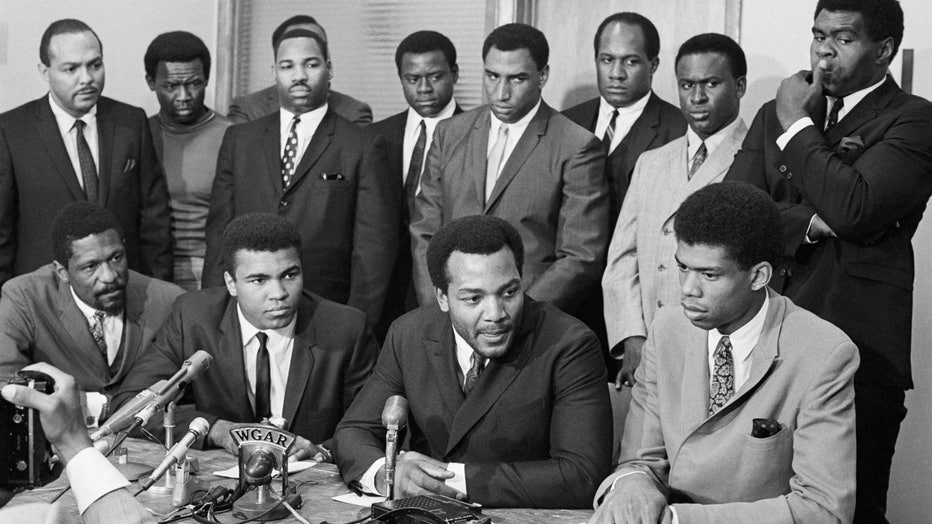
(Original Caption) Nation's top athletes gathered for a meeting at the Negro Industrial and Economic Union to hear Cassius Clay's view for rejecting Army induction. News conference shows (front row) Bill Russell, Boston Celtics; Cassius Clay; Jim Bro
In later years, he worked to curb gang violence in LA and founded Amer-I-Can, a program to help disadvantaged inner-city youth and ex-convicts."
"Jim Brown is a true icon of not just the Cleveland Browns but the entire NFL," said Browns owners Dee and Jimmy Haslam. "He was certainly the greatest to ever put on a Browns uniform and arguably one of the greatest players in NFL history. Jim was one of the reasons the Browns have such a tremendous fan base today.

History of the NFL and how it became the world's richest sports league
The NFL was formed in 1920 when 10 football teams came together in Canton, Ohio, and started the American Professional Football Association (APFA), now known as the NFL.
"So many people grew up watching him just dominate every time he stepped onto the football field but his countless accolades on the field only tell a small part of his story. His commitment to making a positive impact for all of humanity off the field is what he should also be known for."
On the field, there was no one like Brown, who would blast through would-be tacklers, refusing to let one man take him down before sprinting away from linebackers and defensive backs. He was also famous for using a stiff arm to shed defenders in the open field or push them away like they were rag dolls.
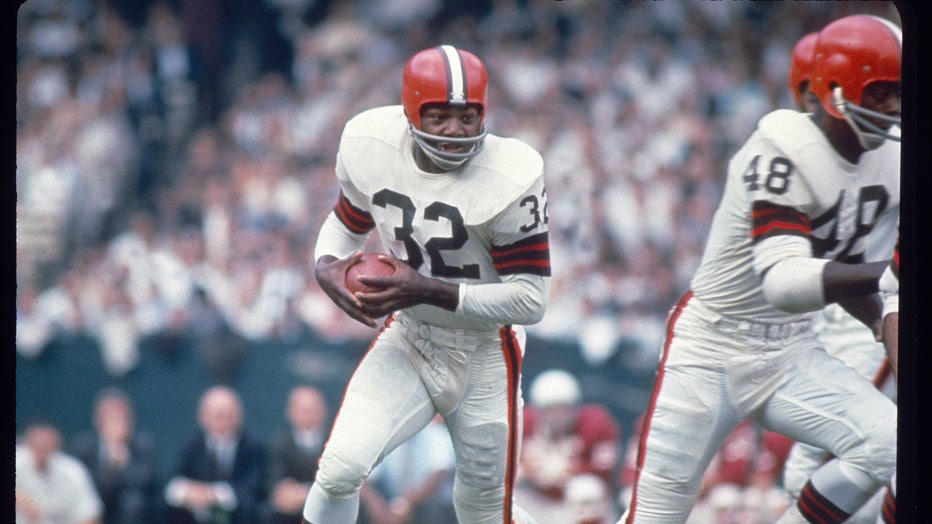
CIRCA 1950's: Jim Brown #32 of the Cleveland Browns carries the ball in a late circa 1950's NFL football game. Brown played for the Browns from 1957-1965. (Photo by Focus on Sport/Getty Images)
"My arms were like my protectors and weapons," Brown said during an interview with NFL Films.
Indeed, Brown was unlike any back before him, and some feel there has never been anyone better than Cleveland’s incomparable No. 32. At 6-foot-2, 230 pounds, he was dominant and relentless, his highlights featuring runs around and right through opponents, fighting for every yard, dragging multiple defenders along or finding holes where none seemed to exist.
After Brown was tackled, he’d slowly rise and walk even more slowly back to the huddle — then dominate the defense when he got the ball again.
Off the field, Brown was a contentious character.
While he had a soft spot for those in need, and his generosity changed lives, he also was arrested a half-dozen times, mostly on charges of hitting women.
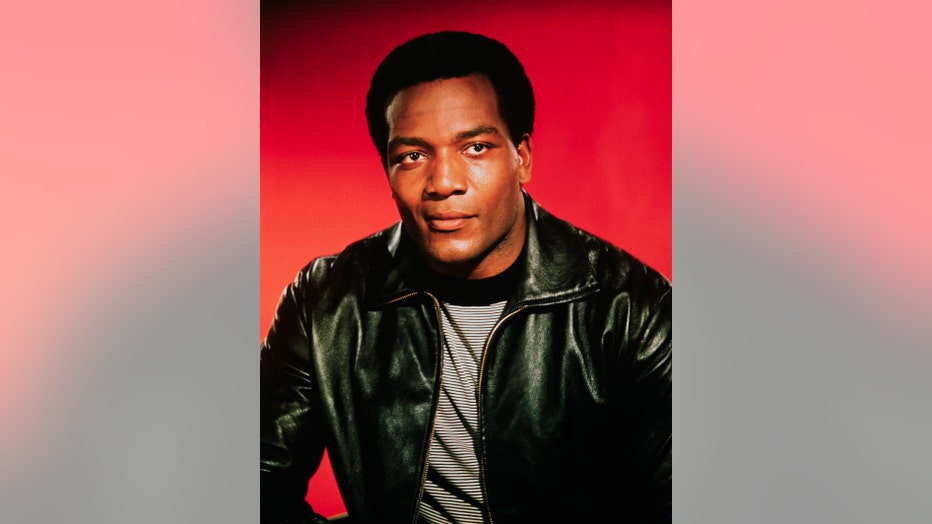
Publicity handout of ex-football player turned actor Jim Brown. He is wearing a black leather jacket with a black and white stripped shirt underneath it. (Getty Images)
In June 1999, Brown’s wife called 911, saying Brown had smashed her car with a shovel and threatened to kill her. During the trial, Monique Brown recanted. Jim Brown was acquitted of a charge of domestic threats but convicted of misdemeanor vandalism. The Los Angeles judge sentenced Brown to six months in jail when he refused to attend domestic violence counseling.
He also feuded with Browns coach Paul Brown and later with the team’s management, although he played his entire career with Cleveland.
When his playing days ended, Brown set off for Hollywood and eventually settled there. Brown advised Cleveland coach Blanton Collier of his retirement while the team was in training camp and he was on the set of "The Dirty Dozen" in England.
Among his films were "100 Rifles," "Mars Attacks!" Spike Lee’s "He Got Game," Oliver Stone’s "Any Given Sunday," and the satire "I’m Gonna Git You Sucka," in which he parodied the blaxploitation genre. In 2002, Brown was the subject of Lee’s HBO documentary "Jim Brown: All-American."
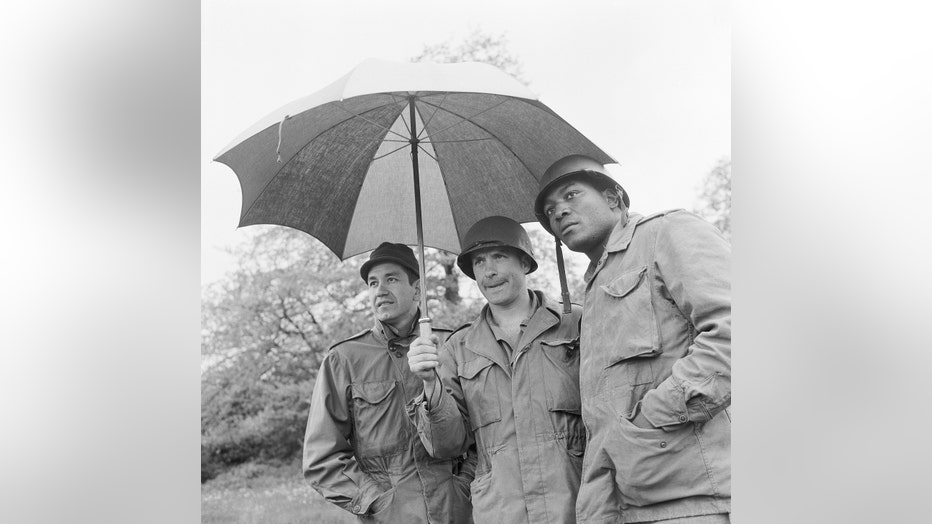
Jim Brown, Trini Lopez, and John Cassavetes on a rainy set of "The Dirty Dozen" in England. This was Brown's first film; Cassavetes was nominated for an Academy Award. (Getty Images)
In recent years, Brown’s relationship with the Browns was inconsistent. He served as an adviser to owner Randy Lerner and was hired to counsel the team’s younger players. However, in 2010, Brown parted ways with the team after having his role reduced by incoming team president Mike Holmgren. Brown felt slighted by the perceived demotion — when the club unveiled a "Ring of Honor" inside its downtown stadium, Brown didn’t attend the ceremony in protest.
Brown was an eight-time All-Pro and went to the Pro Bowl in each of his nine years in the league. When Brown walked away from the game at age 30, he held the league’s records for yards (12,312) and touchdowns (126).
And despite his bruising style, Browns never missed a game, playing in 118 straight.
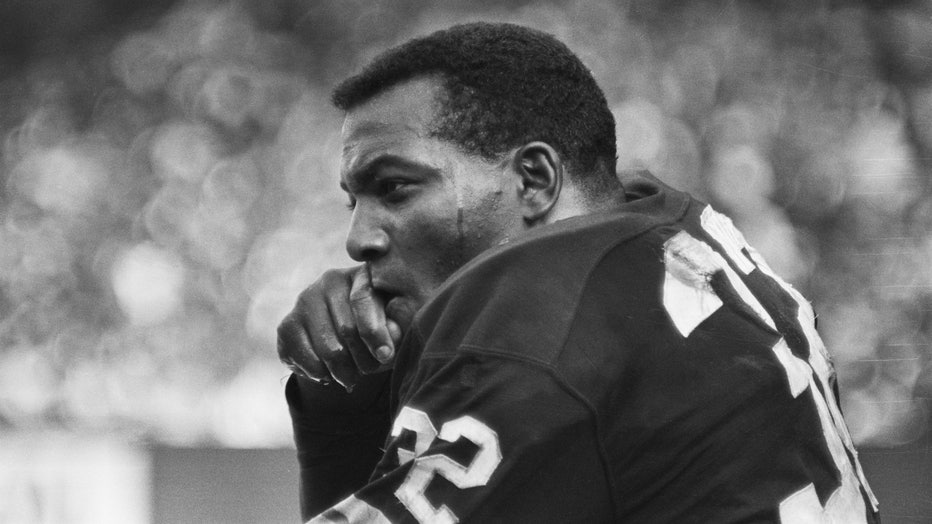
10/20/1963-Cleveland, Ohio-: Jim Brown (Cleveland Browns), close up on bench. (Getty Images)
"He told me, ‘Make sure when anyone tackles you he remembers how much it hurts,’" said Hall of Fame tight end John Mackey. "He lived by that philosophy and I always followed that advice."
A two-sport star at Syracuse — some say he is the best lacrosse player in NCAA history — Brown endured countless racist taunts while playing at the virtually all-white school at the time. Still, he was an All-American in both sports, leading the nation in scoring, and lettered in basketball.
Brown was the sixth overall pick of the 1957 draft, joining a team that routinely played for the title. He was the Offensive Rookie of the Year that season.
Running behind an offensive line featuring Hall of Fame tackles Lou Groza and Mike McCormack, Brown set a league mark with 1,527 yards and scored 17 TDs on his way to the league’s Most Outstanding Player award — a precursor to the MVP — in 1958. Over the next three seasons, he never ran for less than 1,257 yards before picking up just 996 in 1962.
He led the NFL in rushing eight times, gaining a career-best 1,863 yards in 1963. He averaged 104 yards per game, scored 106 rushing touchdowns and averaged an astonishing 5.2 yards per carry. A dangerous receiver as well, Brown finished with 262 catches for 2,499 yards and another 20 TDs.
"I’ve said many times, and I will always say, Jim Brown is the best," Hall of Fame running back Gale Sayers once said, "and he will still be the best long after all his records are broken."
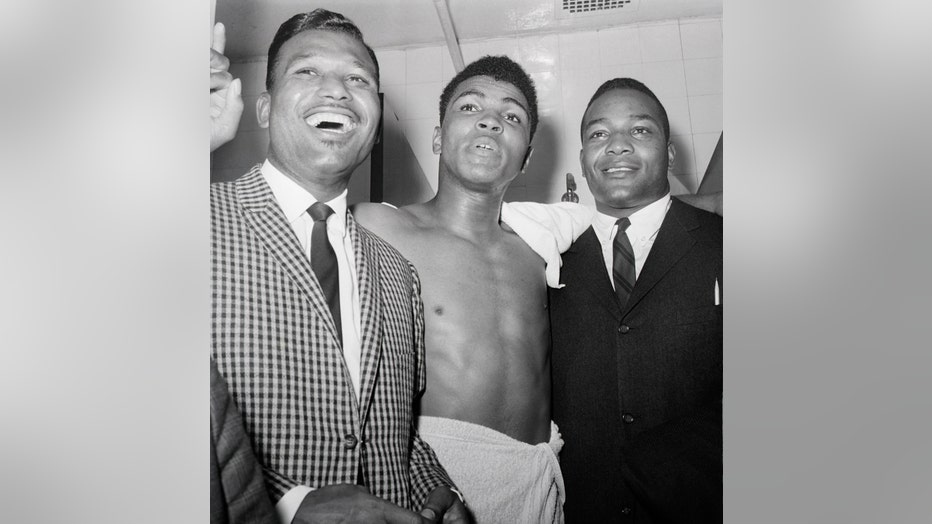
Muhammad Ali is joined in his dressing room by Sugar Ray Robinson and Jim Brown after defeating Doug Joes in a heavyweight contenders' fight. (Getty Images)
Packers great Paul Hornung felt Brown was unstoppable.
"Give me Jim Brown over anybody — at anything," he said.
Brown’s No. 32 was retired by the Browns in ’71, the same year he entered the Hall of Fame. But he rarely visited Cleveland during the 1970s and ’80s. He and Cleveland owner Art Modell were at odds over his sudden retirement; the two later patched up their differences and remained good friends.
Brown supported Modell’s decision to move Cleveland’s franchise to Baltimore in 1995. It was both a reflection of his loyalty to Modell and another sign of his fierce independence. Brown was one of the few former Browns players not angry with Modell for moving the team.
Many of the modern players couldn’t appreciate Brown or his impact on American sports.
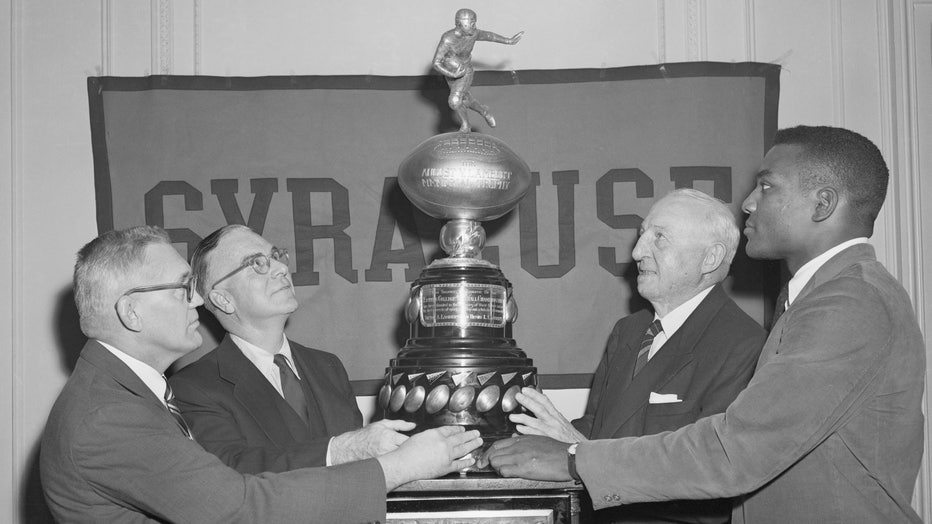
(Original Caption) 12/9/1956-New York, NY- Syracuse All-American Jimmy Brown (R) and university officials examine the Lambert Trophy, symbol of the Eastern College football championship, which was awarded to Syracuse University at the Metropolitan Cl
"They have grown up in a different era," former Browns coach Romeo Crennel said. "He’s one of the greatest players in NFL history and what he was able to accomplish in his time was tremendous. I don’t know that anybody could do what he did, the way he did it, under the circumstances that he had to operate and the things that he had to endure. And for him to go out on top, that’s something that not many guys are able to appreciate either."
Born on Feb. 17, 1936, in St. Simons, Georgia, Brown was a multisport star at Manhasset High School on Long Island. He averaged 14.9 yards per carry in football and once scored 55 points in a game.
Brown later took up golf, and while playing with Jack Nicklaus in the 1963 Cleveland Pro-Am, he shot a 79.
Brown is survived by Monique and their child. He was divorced after 13 years of marriage from Sue Brown, with whom he had three children.

